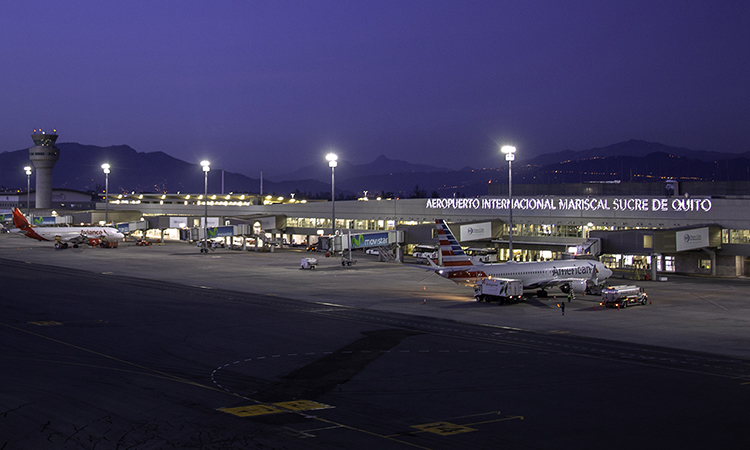In times of crisis, leadership is put to the test: Quito Airport’s response to the pandemic
- Like
- Digg
- Del
- Tumblr
- VKontakte
- Buffer
- Love This
- Odnoklassniki
- Meneame
- Blogger
- Amazon
- Yahoo Mail
- Gmail
- AOL
- Newsvine
- HackerNews
- Evernote
- MySpace
- Mail.ru
- Viadeo
- Line
- Comments
- Yummly
- SMS
- Viber
- Telegram
- Subscribe
- Skype
- Facebook Messenger
- Kakao
- LiveJournal
- Yammer
- Edgar
- Fintel
- Mix
- Instapaper
- Copy Link
Posted: 21 April 2021 | Andrew O'Brian | No comments yet
Andrew O’Brian, President and CEO of Corporación Quiport S.A. – operator of Quito International Airport – writes how the key factors of effective leadership, communication and fluid coordination played a pivotal role in Quito International being the first airport in the region to resume commercial passenger operations.


Credit: Quito International Airport
Quito International Airport (UIO) is a strategic infrastructure system for both the city and country, and is the main entry point into Ecuador by air. Since the COVID-19 crisis began, the operation of the airport and the policies that the health and immigration authorities have implemented here have been key in the efforts that Ecuador has executed to curtail the pandemic.
The role that each and every one of Corporación Quiport’s players have carried out has been fundamental in the handling of the COVID-19 crisis at Quito Airport, which has been considered a success story in the regional and global airport sector.
The role that each and every one of Corporación Quiport’s players have carried out has been fundamental in the handling of the COVID-19 crisis at Quito Airport, which has been considered a success story in the regional and global airport sector”
The factors that have allowed us to face the health emergency decisively were, on the one hand, the absolute understanding of our responsibility for what happens at the airport and, on the other, the need to exercise effective leadership, formed over years, to channel all efforts and initiatives, both from the authorities as well as commercial operators and airlines.
Corporación Quiport, the company in charge of the operation and management of Quito International Airport, belongs to a group of companies – Odinsa of Colombia, CCR of Brazil and HAS Development Corporation of the United States – which, combined, administer a group of eight airports in the region.
Shareholder support, as well as the possibility of exchanging best practices in health matters with group airports and the network of the Airports Council International – Latin America and the Caribbean (ACI-LAC), who have all given us their technical support, have been key to making the right decisions at the right time and implementing any action or measure necessary to face the ever-evolving situation.
Firm initial response
Since the beginning of the crisis, in mid-January 2020, Quiport has held permanent coordination at the highest level with the Ministry of Government, the Ministry of Transport and Public Works, the Ministry of Health, the General Directorate of Civil Aviation, the Municipality of Quito, the Metropolitan Public Company for Airport Services (EPMSA), airlines operating in Quito and our business operators to guarantee that the measures applied at the city airport meet sanitary objectives without losing focus on the international regulations established by the International Civil Aviation Organization (ICAO).
Since the first days of this health crisis, the presence of the Ministry of Public Health of Ecuador has been permanent, applying the respective prevention and control protocols in accordance with the evolution of the pandemic situation in the country and the world.
The work carried out by Quiport and all of the actors involved in air transport at Ecuador’s main airport was not easy”
The work carried out by Quiport and all of the actors involved in air transport at Ecuador’s main airport was not easy. By order of the government, domestic passenger flights were suspended, as well as the arrival of passengers on international flights, and air operations were restricted to only cargo flights and a few international outbound passenger flights which were allowed to operate. By the Ecuadorian State, the circumstances obliged to redouble efforts, especially to handle the export cargo operation, which was essential to keeping alive the production of flowers, the country’s main export product by air.
The administrative staff of Quiport, as well as practically all of the dependencies of public and private entities that operate at the airport, adopted the modality of teleworking from their homes, while fulfilling the home isolation requirement imposed by the government. Meanwhile, the operational staff necessary to keep airport operations open was kept to the bare minimum. Of course, all staff used protective elements, such as masks and gloves, as well as following the recommendations of maintaining a distance of at least one metre from other people, ensuring constant hand washing and using disinfectant gel or alcohol.
We were aware that we had a great responsibility to keep operations open, but even greater was our responsibility to the people who work at the airport and to our travellers.
Communication and fluid coordination are key
Communication is another factor that we have not overlooked. In these situations, the natural fear of a pandemic feeds on misinformation and, aware of this threat, Quiport organised three communication channels: internal to company employees; external to companies and institutions that provide services at the airport, known as the airport community; and, finally, public, aimed at the media and public opinion in general.
In these situations, the natural fear of a pandemic feeds on misinformation and, aware of this threat, Quiport organised three communication channels”
For the company’s management, showing fluid communication on a permanent basis has been fundamental. Keeping all of our stakeholders informed gave us the necessary space to be able to act with calmness, make the appropriate decisions at every moment of the situation and work as a team, as well as listening to the points of view, concerns and needs of all those who are involved in the operation of the airport.
Thus, since the government declared a state of emergency due to the pandemic, Quiport became an active mediator between the authorities, on the one hand, and the airlines and commercial operators, on the other, to find points of consensus that have allowed air operations to remain open, implementing the necessary controls to prevent the airport from being a gateway for active carriers of COVID-19.
Hence, throughout the lockdown, workshops were organised with the Municipality of Quito, the General Directorate of Civil Aviation, the Central government, Quiport and airline representatives to cover all concerns and needs.
During the first weeks of the crisis, contacts were made to work in tandem with the various embassies present in Ecuador to establish information channels that allowed us to provide support to foreigners while they were in Ecuador.
During the implementation of the measures, taking advantage of lessons learned from previous situations – such as the social protests that paralysed the country for 10 days in October 2019 – we implemented mechanisms to regulate the entry of passengers to the terminal in order to avoid crowds of people and facilitate the required social distance.
First airport in the region to resume operations
While other airports in the region remained practically paralysed, at Quito International Airport, we resumed commercial passenger operations on 1 June 2020, mobilising passengers and accumulating experience to operate efficiently, guaranteeing health security.
While other airports in the region remained practically paralysed, at Quito International Airport, we resumed commercial passenger operations on 1 June 2020, mobilising passengers and accumulating experience to operate efficiently, guaranteeing health security”
The protocols and sanitary measures designed by Corporación Quiport to guarantee the safety of passenger operations at the Quito International Airport were reviewed in detail by authorities of the government and the Municipality of Quito.
Prior to the resumption of operations, in an inspection visit carried out by national and city authorities, senior officials were able to demonstrate the functioning of the protocols.
The resumption of operations at Quito International Airport gave rise to positive impacts, not only allowing the start of the reactivation of passenger air transport, but also generating productive activity for companies that offer commercial and aeronautical services at the airport and becoming a decisive factor to collaborate with the reactivation of related sectors, mainly tourism.
Proper enforcement of health protection measures at the airport and the appropriate implementation of biosecurity protocols contributed to the recovery of passenger confidence in air transport. Thus, in June 2020, some 20,000 passengers transited through the airport, while by December 2020, we exceeded 140,000 passengers. However, this was still far from the average of 418,000 passengers per month that we had before the pandemic.
Trust is not gained from one moment to the next; it depends on an ongoing process that requires discipline and time, and Quito Airport has a head start in this regard, as it has already made progress with passengers.
The first actors to benefit from the resumption of flights were, of course, the airlines, which need to get their planes in the air to generate traffic.
Crisis-proof team
Behind all of this is a highly committed and highly professional team. The most resilient companies are those that can face crises head-on and overcome them to move forward. Resilience is something that we have acquired over the years, facing many complex situations that occur in the airport industry together and others typical of the social and economic environment in which our operation is located. The management of the company has always focused on sharing with the team the idea that together we will prevail and emerge stronger from this point forward.
Resilience is something that we have acquired over the years, facing many complex situations that occur in the airport industry together and others typical of the social and economic environment in which our operation is located”
However, it is also essential to have the support of the authorities. EPMSA is the municipal entity that acts as Quiport’s counterpart in the Public Private Alliance for the management of the airport. The excellent relationship we have developed with the General Manager of EPMSA, Sandro Ruiz, allows us to maintain a direct channel at the highest municipal level to ensure total alignment, which is essential to develop proactive management. Ruiz perfectly understands our role, allows us to act and intervenes in a timely manner when circumstances demand it.
At Quiport and Quito Airport, we are committed to the future. We are expectant that things will go back to normal, yet simultaneously we know that the negative effects will be felt for months onward. We, the 9,000 people and more than 100 entities that work at the airport, are ready to overcome the crisis and resume our role as one of the main engines of the economy of Quito and Ecuador.
Andrew O´Brian is an internationally experienced airport leader who is currently President and CEO of Corporación Quiport S.A., the operator of Quito International Airport. Before joining Quiport, O’Brian was CEO of AERODOM in the Dominican Republic, a challenging package of six airports.
O’Brian is currently the President of the Airports Council International – Latin America and Caribbean (ACI-LAC) Regional Board, which represents the interests of 69 operators who are present in more than 275 airports across 34 countries in the region. He also sits on the ACI World Governing Board and is the Vice Chair of the American Association of Airport Executives.
Related topics
Air freight and cargo, Airport crisis management, Airside operations, COVID-19, Passenger experience and seamless travel, Safety, Terminal operations
Related airports
Related organisations
Airports Council International Latin America & Caribbean (ACI-LAC), Corporación Quiport, International Civil Aviation Organization (ICAO)


















